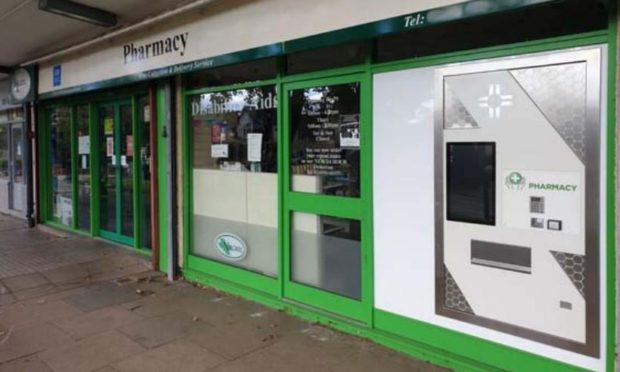A pharmacy chain has lodged plans to install a medicine “vending machine” at one of its north-east branches.
Davidsons Chemist, which runs a store on Banchory High Street, wants to use the Pharmasafe24 robot to let customers pick up prescriptions around the clock.
It says this would allow staff to spend more time with patients, while reducing waiting times for customers.
The firm has applied to Aberdeenshire Council for permission to set up the machine.
How does it work?
Plande, which has lodged the documents on behalf of Davidsons Chemists, says there are more than 500 of these machines in the Netherlands and almost 100 in operation in the UK.
When using the Pharmaself24 service, pharmacists dispense medication as normal then load them into a specific box from the back of the machine.
The customer is then told their prescription is ready to collect and is sent a text with a one-time-use code.
This number is typed into the machine and the patient receives their package.
As people do not need to pay for prescriptions in Scotland, the machine will not store any money.
Any controlled medications will not be kept within the Pharmaself24 robot, which Plande says reduces the risk of anyone trying to steal its contents, and it will also be monitored by CCTV.
It has been likened to the “locker”-style collection points used by online retailers such as Amazon, and has the capacity for 180 bags at any one time.
The planning application notes: “Compared to the medicines stored within the dispensary, there is little incentive to target the Pharmaself24 and its contents.
“This is reflected in the hundreds of installations across Europe with no reported attempted break-ins to-date.”
What are the benefits?
It is claimed the Pharmaself24 machine will allow the Banchory pharmacy to run more efficiently, as it will reduce queueing times and free up staff from dispensing routine items to spend more time with customers.
This could also benefit patients who will have more flexibility as to when they collect their medications, rather than only being able to during chemist opening hours.
The application added: “The machines have operated in numerous premises throughout the current pandemic and have proved itself invaluable in providing a contact-free and continuous service, supporting the NHS services and providing an invaluable community benefit while negating footfall inside of buildings and reducing face-to-face meetings.”
Machines where ‘convenience is paramount’
Alongside its Banchory branch, Davidsons Chemist has also lodged a planning application for a Pharmaself24 machine in Milnathort, south of Perth.
Managing director Allan Gordon said the company is planning carefully where else the robots could be rolled out, as the expenses of installing and running them will often outweigh the benefits.
“We’ve an estate of 44 pharmacies across Scotland, and each machine costs in the region of £40,000 to £50,000,” he said.
“So if we were to put one in every pharmacy, that would be an investment in excess of £2 million.
“But we’ll put them in locations where there is a big population and convenience is paramount, and we’ve judged Banchory to fall into that category.
“We may put them in up to another four that are suitable, but they’d be in a minority of our pharmacies.”
Pioneering vending machines
Prescription vending machines have been seen elsewhere in Scotland in recent years, including Falkirk and Irvine.
But is is thought this may be the first time the machines have been brought to the north-east.
The region has led the way when it comes to this type of technology in a number of other areas, however.
In 2017 the country’s first self-pouring milk vending machine was unveiled at a farm in Aberdeenshire.
Forest Farm at Glasgoforest said the equipment would herald the start of a “new era” for the business.
Owners Will and Angus Willis travelled to farms in England where the technology was already in place, in order to replicate it north of the border.
Their machine takes coins, notes and contactless payments, with customers able to fill up a plastic or glass bottle with fresh milk.
And in 2004, Scotland’s first-ever hole-in-the-wall pizza service launched in Aberdeen.
For £8, the bright orange Heavenly Pizzas machine would deliver either a margherita or pepperoni 12-inch pre-sliced pie with just a few button presses.
It had been hoped the idea could be expanded into hospitals, university halls of residence and budget hotels, but failed to take off.
